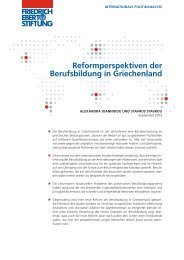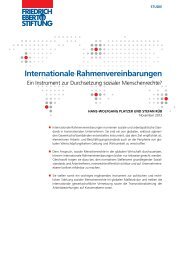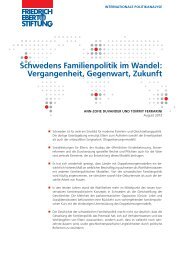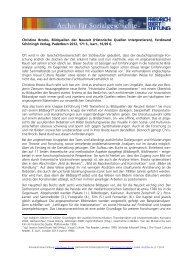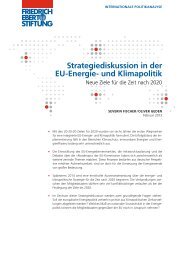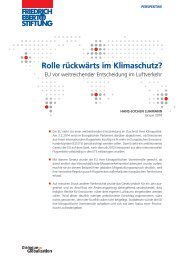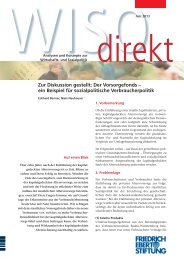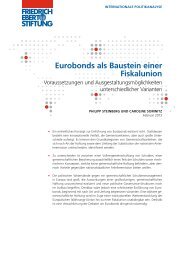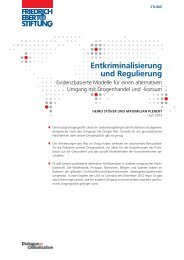Women - men - gender. - Bibliothek der Friedrich-Ebert-Stiftung
Women - men - gender. - Bibliothek der Friedrich-Ebert-Stiftung
Women - men - gender. - Bibliothek der Friedrich-Ebert-Stiftung
Create successful ePaper yourself
Turn your PDF publications into a flip-book with our unique Google optimized e-Paper software.
48 STRUCTURING GLOBALIZATION SOCIALLY<br />
Gen<strong>der</strong> on the agenda of develop<strong>men</strong>t cooperation<br />
It is also to the credit of the FES that during the<br />
conference on develop<strong>men</strong>t fi nancing in Doha,<br />
<strong>gen<strong>der</strong></strong> issues took centre stage. In the run-up to<br />
the Doha conference, at a preliminary international<br />
symposium in Bonn issues such as national<br />
resources, trade relations and govern<strong>men</strong>t develop<strong>men</strong>t<br />
aid, which were to be taken up at Doha, were<br />
discussed extensively and analyzed in detail.<br />
There was unanimity on the fact that <strong>gen<strong>der</strong></strong>-budgeting<br />
led to increased growth. The examples cited<br />
were the programmes extending credit to wo<strong>men</strong>.<br />
Studies corroborate that wo<strong>men</strong> spend a larger proportion<br />
of their earnings on their families than<br />
<strong>men</strong>. In the run-up to Doha, a new approach – in<br />
addition to providing loans to wo<strong>men</strong> – was discussed,<br />
namely, social security systems for the<br />
poorest, which was to benefi t especially poor<br />
wo<strong>men</strong> and their children.<br />
During the Doha conference, there were lively discussions<br />
on the consequences of trade liberalization.<br />
In the panel discussion organized and mo<strong>der</strong>ated<br />
by the FES, people were cautioned against<br />
“<strong>gen<strong>der</strong></strong> blind” liberalization. Such an approach, it<br />
was felt, would lead to an increase in informal jobs,<br />
which carried neither job nor income guarantees.<br />
The working conditions were deteriorating; there<br />
were either few or even no workers’ rights. As a<br />
positive counter-example, experiences from Cambodia<br />
were cited: there the quota regulations and<br />
the guaranteed compliance with work norms had<br />
resulted in an increase in employ<strong>men</strong>t and exports.<br />
This positive develop<strong>men</strong>t was observed routinely<br />
in developing countries, where alongside economic<br />
initiatives, measures to alleviate poverty, to promote<br />
environ<strong>men</strong>tal norms and <strong>gen<strong>der</strong></strong> equality<br />
were also introduced.<br />
FRIEDRICH-EBERT-STIFTUNG





